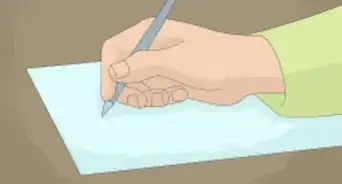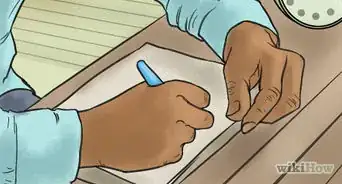This article was co-authored by Gina D'Amore. Gina D'Amore is a Financial Accountant and the Founder of Love's Accounting. With 12 years of experience, Gina specializes in working with smaller companies in every area of accounting, including economics and human resources. She holds a Bachelor's Degree in Economics from Manhattanville College and a Bookkeeping Certificate from MiraCosta College.
There are 8 references cited in this article, which can be found at the bottom of the page.
This article has been viewed 53,063 times.
You might spend your free time writing, or perhaps you’ve always dreamed of making a living as a writer. Maybe you are looking to make the leap to becoming a paid professional writer, or you might want to supplement your income with some freelance writing gigs. There are certain steps that you should take in order to get paid for your craft. This involves building your skills, marketing yourself, and searching for writing jobs in unconventional places. With patience, perseverance, and quality writing, you can get paid for doing the writing that you love.
Steps
Getting Prepared
-
1Determine your writing strengths. Before you begin seeking writing jobs, you should have a solid idea of what you write well. There are many different styles of writing, from technical or casual to academic or narrative fiction. Figure out what type of writing you do best.
- Look at the types of writing you’ve done in the past. What has been received well? What has been enjoyable to write? These are likely your strengths. On the other hand, if you’ve struggled with certain types of writing, these might be types to avoid.
-
2Make a list of topics you like to write about. There is a nearly unlimited number of outlets you could potentially write for. Every possible niche is covered by some publication, either in print or online. Make a list of topics that you can write about. [1]
- If you have a particular hobby or skill in a certain area, think about how you can share your expertise through writing. For example, you might be an avid skier and can write about different ski resorts you’ve visited. Or, you might like to write about woodworking, giving step-by-step instructions for making birdhouses.
Advertisement -
3Assemble your writing samples. When someone is looking to hire a writer, he or she will want to see samples of your writing skill and style. Put together your strongest samples in a portfolio.[2] These will represent you as you search for writing gigs.
- It’s likely best to make an online portfolio. Save your writing samples as PDF files so that they are easily downloadable.
-
4Write your resume. Demonstrate your experience in writing by putting together a resume that lists different writing jobs you’ve had. Make a list of every kind of writing you’ve done for someone else. This can include any kind of writing, such as newspaper articles, advertising copy, voiceover narration, website copy, headlines, captions, book or film reviews, and so on. Include the approximate length of the piece, as well as the date and employer. If you have an online link, include that on your list.
- Search online for suitable formats for a writing resume.
Building Your Skills
-
1Write a lot. The key to getting paid to write is to be prolific. Many types of paid writing require that you write well at a quick pace. If you write every day, you can develop a strong portfolio as well as skills that make writing easier for you.
-
2Take a class. Taking a class is a great way to develop your skills in different styles of writing. A class can also help you connect with other people who might have leads on writing jobs. Visit your local community college or university to find classes that you might be interested in.
- Think outside the box. You don’t need to take a class that is specific to writing, such as creative writing. You can also take a class on multimedia production, advertising, or other topics. These types of classes involve writing and may jumpstart your skills in new types of writing.
-
3Brush up on your editing skills. Many writers get a start with editing jobs. A solid understanding of grammar and syntax can help you get jobs as an editor. This in turn can help you connect with writers who may have ideas about where to look for paid writing work.[3]
Finding Outlets to Publish Your Work
-
1Network with friends and acquaintances. Put the word out that you’re looking for writing jobs. You never know when they might pop up. Start with your circle of friends and close acquaintances.[4] Share your writing with them. Offer to write one piece for free as an incentive.
-
2Start a blog and sell advertising on it. If you’re not finding enough work through other outlets, try starting your own blog. This way, you can choose a topic about which you are most skilled in writing. You can tailor it to your own interests and you can write and publish as often as you want. The drawback to starting your own blog is that you are single-handedly fronting all of the effort to write, publish and market your work.
- Start selling advertising on your blog. Look into different revenue sources, such as Google AdWords or others.[5] Depending on your blog’s traffic, you may be able to generate a healthy income with advertising on your blog.
-
3Look into print media. Don’t forget print media as a viable option for finding writing work. While it may be difficult to get published in the larger, more well-known print publications, there are small print magazines and newspapers that need compelling writing. Find niche magazines or local newspapers that may be looking for writers.[6]
-
4Self-publish your own book. You may be burning to write a novel or other type of book, and you want to be paid for it. Luckily, it is easier than ever to make this happen. Once you have your book written, find a platform online that enables you to publish an e-book, or find a print publisher that will make hard copies of your book.
- The key to successful self-publishing is relentless promotion of your book. If you are not going to promote your book yourself, you shouldn’t expect that your book will be very successful.
-
5Brainstorm other outlets. There are a ton of different types of outlets that need writing. These may be topical, such as travel websites, instructional websites, technical magazines, or erotica. Start-ups need writing on their websites, brochures, ad copy, and so on.[7]
Promoting Yourself
-
1Build a website for yourself. When you are looking for writing jobs, you should make your writing samples, resume and contact information easily accessible for potential employers. Build a website for yourself. It doesn’t have to be flashy or fancy, but it should represent yourself professionally.
- Take special care to ensure that you don’t have any spelling or grammatical errors. If you want to get hired as a writer, all of your writing should be meticulous, including the writing on your website.
-
2Make sure you have a positive online presence. One of the first things that someone will do before hiring you for a job is search online for you. Make sure you are represented in a positive light by searching for yourself online. Then work to improve your online presence.
-
3Promote yourself on social media. People connect on social media sites like Facebook, Twitter, Instagram, LinkedIn, and others. These sites are great ways to cultivate personal and professional connections.[8] A client may not be actively seeking out your services, but he might come across your material through a friend’s connection and decide to hire you. Getting your name out there is crucial for finding writing gigs.
-
4Use other methods of promoting yourself. While many people may only promote themselves online, there are other ways to promote yourself. These “low-tech” ways may even reach people you aren’t reaching online, exposing you to more potential business.
- Try making a brochure, or attend a writer’s conference. You can also place ads in a local or regional newspaper or on Craigslist.
-
5Talk about yourself. It may be uncomfortable for you to talk about what a skilled writer you are. But if you want others to believe it, you need to tell them. This doesn’t mean that you need to constantly talk about how great you are, but you need enough confidence to reassure a potential employer that you have the chops necessary to do a good job.
Taking Care of the Business Side
-
1Establish your rates. Figure out what you would like to be paid for writing. You may have different rates for different outlets; for example, you might charge less to write an article for a nonprofit organization’s blog than you would for a larger business. You can be flexible on your rates, but you should establish a standard.[9]
- It’s important to have rates so that you have a fee to quote if you are hired for a writing job. There are many websites and other publications that need writing, but they often don’t know what to charge. Give them a starting point and negotiate depending on length, difficulty and time involvement.
- It’s also important to not charge too little. If you are constantly undercutting your rates, you may find it difficult to raise them and earn what you really deserve.
-
2Get an online payment account. If you are trying to get writing jobs that pay by the piece, you may get many small payments. It can be easier for many employers or outlets to pay you through a simple payment service like PayPal.[10]
- You can usually register for free on an online payment service like PayPal, but they may take a small percentage of your pay.
-
3Keep track of your writing income. If you’re making money, you’ll likely have to claim it on your taxes.[11] Make sure you keep meticulous records of your income, including job, date, and amount.
- If you are collecting royalties from a book, remember that this is also taxable income.
-
4Keep your materials up-to-date. Show your clients that you are an active writer who is currently working. Even if you’re not getting paid, you should still have relevant, current examples of your writing available on your website. Every six months or so, comb through your writing to find the best of your recent work. Add one or two of these to your portfolio.
Expert Q&A
-
QuestionWhat's the best way to get paid as a freelancer?
 Gina D'AmoreGina D'Amore is a Financial Accountant and the Founder of Love's Accounting. With 12 years of experience, Gina specializes in working with smaller companies in every area of accounting, including economics and human resources. She holds a Bachelor's Degree in Economics from Manhattanville College and a Bookkeeping Certificate from MiraCosta College.
Gina D'AmoreGina D'Amore is a Financial Accountant and the Founder of Love's Accounting. With 12 years of experience, Gina specializes in working with smaller companies in every area of accounting, including economics and human resources. She holds a Bachelor's Degree in Economics from Manhattanville College and a Bookkeeping Certificate from MiraCosta College.
Financial Accountant A check, definitely! A check is a legal document—you have to include your date and signature and the bank has to go through it.
A check, definitely! A check is a legal document—you have to include your date and signature and the bank has to go through it. -
QuestionDoes wikiHow pay its contributors or writers?
 DonaganTop AnswererNo, all contributors are volunteers.
DonaganTop AnswererNo, all contributors are volunteers. -
QuestionWhat if I don't have PayPal?
 Community AnswerThat's okay, you can find another online payment like Venmo, Apply Pay, Skrill, Stripe or Bitcoin instead. Choose one that works for your needs.
Community AnswerThat's okay, you can find another online payment like Venmo, Apply Pay, Skrill, Stripe or Bitcoin instead. Choose one that works for your needs.
References
- ↑ http://thewritelife.com/how-to-make-your-first-100-as-a-freelance-writer/
- ↑ http://www.freelancewriting.com/articles/become-a-freelance-writer-and-get-paid.php
- ↑ http://www.copyblogger.com/get-paid-to-write/
- ↑ http://www.copyblogger.com/get-paid-to-write/
- ↑ http://www.entrepreneur.com/article/224560
- ↑ http://www.copyblogger.com/get-paid-to-write/
- ↑ http://www.copyblogger.com/get-paid-to-write/
- ↑ http://writetodone.com/become-a-highly-paid-writer-avoid-these-7-habits/
- ↑ http://www.freelancewriting.com/articles/how-to-set-your-freelance-writing-rates.php



















































































